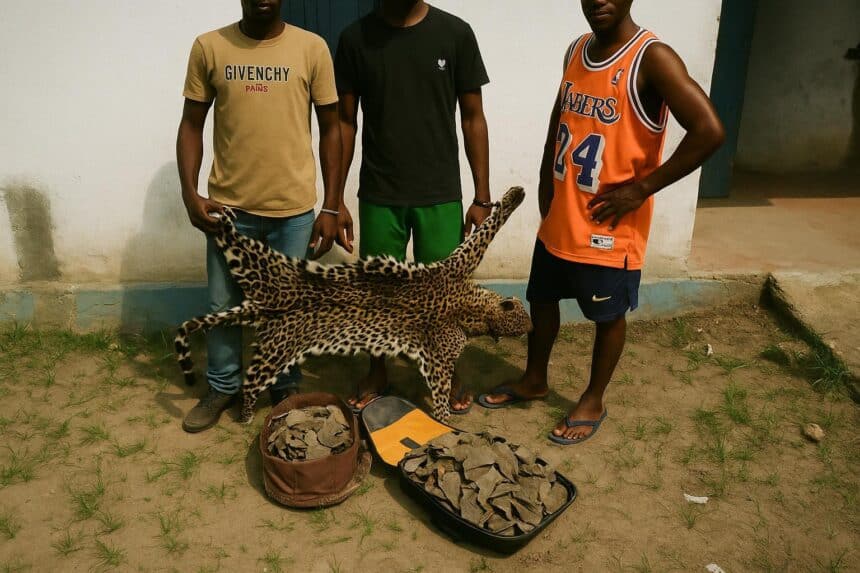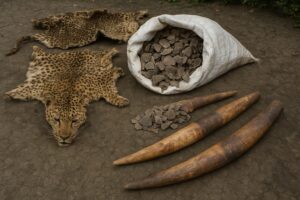Courtroom Signal to Traffickers
Inside the modest chambers of the Tribunal de Grande Instance of Impfondo, the gavel fell with unusual resonance on 26 June 2025. Judges sentenced Jodel Mouandola to three years’ imprisonment and his accomplices, Arel Ebouzi and Parfait Mbekele, to two years each, in addition to a collective financial penalty of four million CFA francs. Although the sums involved remain modest by international standards, the custodial nature of the verdict carries symbolic weight across the Likouala department, a region often described by conservationists as the northern gateway to the Congo Basin.
From Panther Hide to Handcuffs
The file established that on 27 May 2025 the two principal defendants were apprehended in flagrante delicto with a panther pelt, several kilograms of pangolin scales and four giant pangolin claws. Their subsequent confession led investigators to the alleged owner of the trophies, arrested the same evening in Épéna-Centre. According to officers of the Direction Départementale de l’Économie Forestière, the items were destined for a network linking local hunters to regional intermediaries operating along the Oubangui River corridor.
Multi-Agency Coordination Takes Shape
What sets the episode apart is the cooperative architecture behind the arrests. Gendarmerie units in Impfondo and Épéna worked side by side with wildlife officers and benefited from the technical support of the Project for the Application of Wildlife Law, better known by its French acronym PALF. John Chrysostome Bokika, a senior PALF jurist interviewed after the verdict, applauded the court’s celerity, stressing that “predictable justice remains a cornerstone of deterrence in remote provinces”. Similar praise was voiced by representatives of the Ministry of Forest Economy, who view the case as evidence that decentralisation reforms launched in 2022 are beginning to bear fruit.
Legal Foundations and International Commitments
The proceedings relied on Article 27 of Law 37-2008, which prohibits the possession, transit or sale of trophies from species classed as fully protected, save for narrowly defined scientific purposes. The national text echoes Congo-Brazzaville’s obligations under the Convention on International Trade in Endangered Species of Wild Fauna and Flora (CITES), to which the country acceded in 1983. A recent United Nations Office on Drugs and Crime overview situates pangolins among the world’s most heavily trafficked mammals, underscoring why CITES states increasingly face scrutiny over enforcement gaps (UNODC 2024). Against that backdrop, the Impfondo judgment aligns domestic jurisprudence with multilateral expectations.
Diplomatic Reverberations in the Congo Basin
Wildlife governance is no longer a niche environmental issue but a component of regional diplomacy. Brazzaville hosted in 2024 the fifth Summit of the Three Basins, drawing attention to the transboundary nature of biodiversity crime. Delegates from Cameroon and the Central African Republic frequently cite the porous green frontiers of the Likouala as both a conservation treasure and a policing challenge. By delivering a firm sentence, the Congolese judiciary strengthens the country’s voice in ongoing negotiations on carbon finance and debt-for-nature swaps, instruments predicated on demonstrable rule-of-law credentials.
Balancing Livelihoods and Law Enforcement
Local civil-society actors emphasise that punitive measures must be coupled with alternative livelihoods. According to a 2023 World Bank rural assessment, more than 60 percent of households in northern districts supplement income through bushmeat commerce. The Ministry of Agriculture has accordingly expanded pilot schemes for sustainable cocoa and non-timber forest products. While the court decision showcases legal resolve, policymakers acknowledge that long-term success hinges on economic incentives that make illicit wildlife extraction less alluring.
Regional Implications and Forward Outlook
The Impfondo verdict forms part of a broader jurisprudential trend in Central Africa, where courts increasingly translate wildlife statutes into tangible jail time. In the Republic of Congo, case files compiled by the Ministry of Justice record a 35 percent rise in wildlife crime prosecutions since 2020, a statistic welcomed by diplomatic partners such as the European Union, whose Eco-FAC programme invests in capacity-building for prosecutors. For diplomats posted in Brazzaville, the message is clear: conservation and governance agendas are converging, and tangible enforcement actions are likely to feature prominently in upcoming bilateral dialogues on security and sustainable development.


















